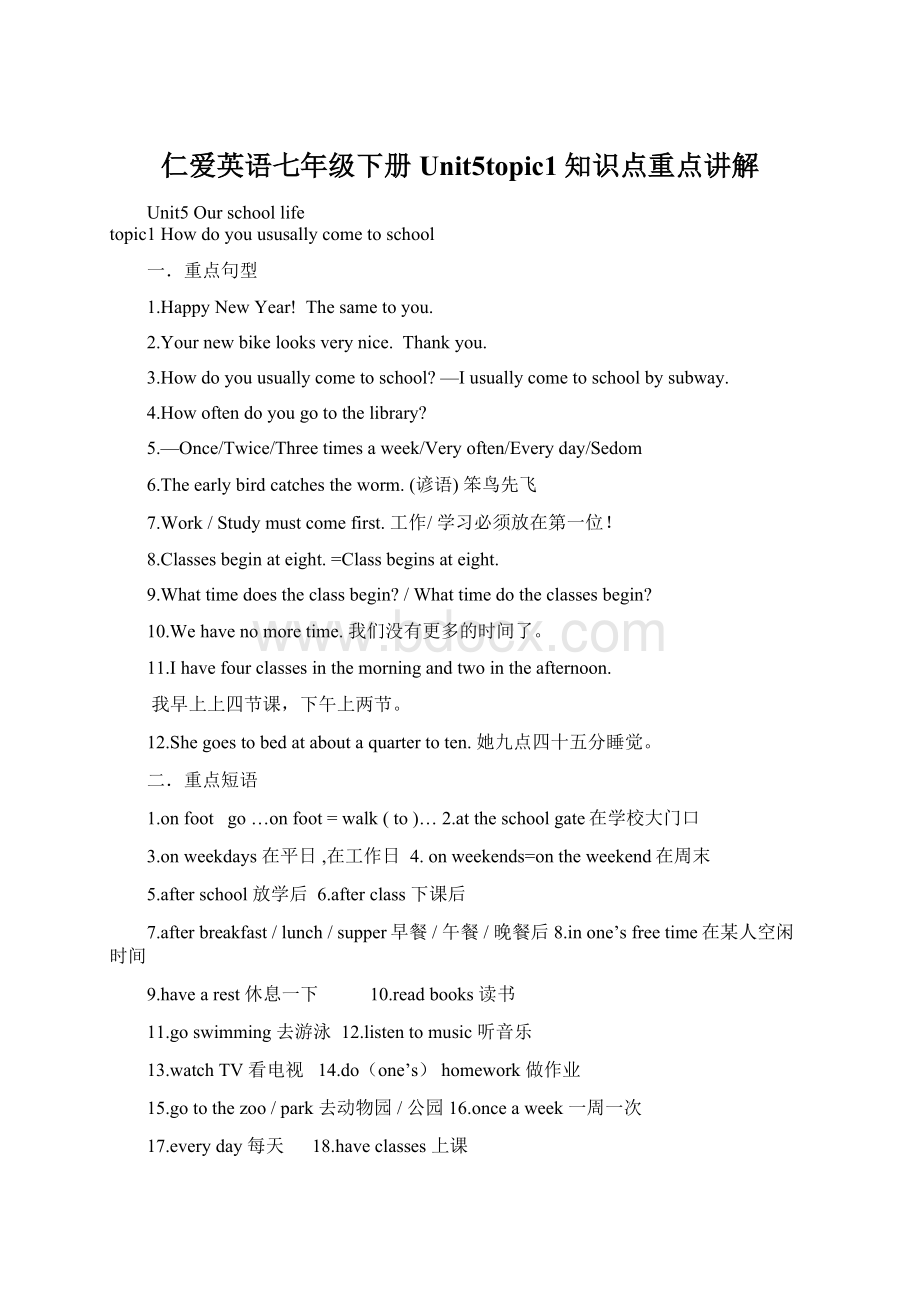仁爱英语七年级下册Unit5topic1知识点重点讲解.docx
《仁爱英语七年级下册Unit5topic1知识点重点讲解.docx》由会员分享,可在线阅读,更多相关《仁爱英语七年级下册Unit5topic1知识点重点讲解.docx(33页珍藏版)》请在冰豆网上搜索。

仁爱英语七年级下册Unit5topic1知识点重点讲解
Unit5Ourschoollife
topic1Howdoyouususallycometoschool
一.重点句型
1.HappyNewYear!
Thesametoyou.
2.Yournewbikelooksverynice. Thankyou.
3.Howdoyouusuallycometoschool?
—Iusuallycometoschoolbysubway.
4.Howoftendoyougotothelibrary?
5.—Once/Twice/Threetimesaweek/Veryoften/Everyday/Sedom
6.Theearlybirdcatchestheworm.(谚语)笨鸟先飞
7.Work/Studymustcomefirst.工作/学习必须放在第一位!
8.Classesbeginateight.=Classbeginsateight.
9.Whattimedoestheclassbegin?
/Whattimedotheclassesbegin?
10.Wehavenomoretime.我们没有更多的时间了。
11.Ihavefourclassesinthemorningandtwointheafternoon.
我早上上四节课,下午上两节。
12.Shegoestobedataboutaquartertoten.她九点四十五分睡觉。
二.重点短语
1.onfoot go…onfoot=walk(to)…2.attheschoolgate在学校大门口
3.onweekdays在平日 ,在工作日 4. onweekends=ontheweekend在周末
5.afterschool放学后 6.afterclass下课后
7.afterbreakfast/lunch/supper早餐/午餐/晚餐后8.inone’sfreetime在某人空闲时间
9.havearest休息一下 10.readbooks读书
11.goswimming去游泳 12.listentomusic听音乐
13.watchTV看电视 14.do(one’s)homework做作业
15.gotothezoo/park去动物园/公园16.onceaweek一周一次
17.everyday每天 18.haveclasses上课
19.forashorttime一会儿 20.gotobed上床睡觉
eon快点,加油,来吧 22.getup起床
23.talkwith/tosb.与某人谈话 24.atschool在学校、在上课
25.gotoschool去上学26.andsoon……等等
三.重点详解
1.by+交通工具,表示使用某种交通方式,中间不加限定词,如果交通工具前有a,the,my等
限定词,就不能用by,而是用in或是on.by+动词ing形式,表示通过某种方式
乘坐交通工具:
by+交通工具(bycar/bus/train/ship)
takethe+交通工具(takethebus/car)
on+大型封闭式工具(onthebus/train/ship/plane)
onthetrain=bytrainonhisbike=bybikeonabike/motorbike
in+小型封闭交通工具(inacar/taxi)inmycar=bycar
Ialwayscometoschoolbybus.(表交通工具)
Peopleshowlovetotheirmothersbygivingcards.(表方式)
Youcanbeagoodstudentbyworkinghard.(表方式)
Heoftengobackhome____________/_____________(bus)(使用两种表达方式)
JanealwayscomestoChina____________/_____________(plane)(使用两种表达方式)
Idon’twanttogothere____________/_____________(bike)(使用两种表达方式)
巧辩异同 onfoot与walkonfoot“走路”,是介词短语,不能作谓语,只作方式状语,位于句末。
walk“走路”,是动词,可以作谓语。
takethebus=go…bybus rideabike=go…bybike
takethesubway=go…bysubway
goto…onfoot=walktoIoftengotoschoolonfoot.=Ioftenwalktoschool.
goto….bybike=rideabikegoto….bycar=driveacarto
goto…byplane=flytogoto…bybus=takeabusto
Ioftengohomeonfoot(写出同义句)
Ioften_________________.
Healwaystakesthebustoschool.(写出同义句)
Healways_______________________________.
Hisfatherususallygotoworkbycar.(写出同义句)
Hisfatherusually________________work.
2.It’stimeforsth.“该做某事了”=It’stimetodosth.
It’stimeforclass.=It’stimetohaveclass.=It’stimeforhavingclass.
句子:
It’stimeforlunce(写出同义句)
3.look+adj(look感官动词,系动词)看起来
Hismotherlooksveryyoung.Theylookverycute.
Herdresslooksverynice.Youlookverycoolinthiscoat.
注意:
Look作为实义动词时候,和作为系动词时候的区别
用Look,Lookat填空。
!
Thereisanplaneinthesky.
Please__________________theblackboard.
You________veryniceonthisskirt.
look的短语lookthesame看起来一样 looklike看起来像……
lookfor寻找lookafter=takecareof照顾,照料
lookaround/about四处看看,四下环顾;lookback回头看;回顾;
lookout当心,小心,留神;lookthrough浏览,仔细查看;
lookup查寻,查阅;抬头看
4.doone’shomework做家庭作业(注:
one’s要随主语的变化而变化,常用形容词性物主代词my,your,their,our,his,her等)。
domyhomeworkatschool在学校做作业
5.wanttodosth.“想做某事”,want后接动词不定式作宾语。
knowabout“了解,知道关于…”。
wewanttoknowabouttheschoollifeofAmericanstudents.
我们想了解一下美国学生的学校生活。
HeknowsalotaboutChina.他对于中国非常了解。
用所给词的正确形式填空:
He___________________(want)buyapairofshoesforhismother.
Jimmy__________________(want)onepairofbasketballshoes.
6.巧辩异同
afew+可数名词(肯定);一点,一些;few+可数名词:
(否定)很少,几乎没有
alittle+不可数名词(肯定);一点,一些;little+不可数名词:
(否定)很少,几乎没有
little和few作形容词用,都表示“几乎没有”,强调少;alittle和afew强调有一些。
E.g.Hehasafewfriends.他有几个朋友。
Hehasfewfriends.他几乎没有朋友。
E.g.IcanspeakonlyalittleChinese.Theyhaslittlemoney.他们没有什麽钱
alittle与little也可以用作副词,表示“有点”“稍稍”表示“很少”
e.g.CanyouspeakEnglish?
---Yes,butonlyalittle.
Thisbookisalittlemoredifficultthanthatone.(可修饰形容词比较级)
Shesleptlittlelastnight.昨天晚上,她没有怎么睡觉。
用few,afew,little,alittle填空。
1.Hehas_________friendsthere.
2.Iusuallyonlyeata_______atlunchtime.
3.Very_______childrenlikegettingupa5o'clockinthemorning.
4.Hewantedtodrink__________orangejuice
7.go+v.-ing表示去做某事,类似:
gofishing去钓鱼goshopping去买东西
goboating去划船goskating去滑冰goswimming去游泳
andsoon“等等”,表示还有很多。
Theyoftenplaybasketballorcoccer,goswimmingandsoon.
翻译下列句子:
去钓鱼怎么样?
Howabout_________________?
为什么不和我们一起去游泳呢?
Whynot_______________withus?
你想要去购物吗?
Wouldyoulike____________________?
8.
(1).Howoften多久一次(对频度进行提问)
答语常用频度副词always>usually>often>sometimes>seldom>never等或单位时间内
的次数,表示频率的短语:
次数+单位时间
e.g.:
onceaweek一周一次twiceamonth每月两次threetimesayear每年三次
Howoftendoyougotothelibrary?
你多久去一次图书馆?
--once/twice/threetimes/fourtimesaweek/month/year
(2).Howfar多远(表示距离)Howfarisitfromheretothezoo?
--It’s6kilometers.
(3).Howlong多长(对时间进行提问,持续多长时间(多久)/东西的长度(多长)
Howlongdidhestayhere?
Abouttwoweeks.
Howlongistheriver?
About500km.
(4).Howsoon再过多久,主要用来表示对将来一段时间的提问。
常用“in+时间段”来回答。
Howsoonwillhebeback?
Inanhour.
9.over(形容词)School/Classisover.Whattimeistheclassover?
10.begin现在分词:
beginning过去式:
beganWhattimedoestheclassbegin?
begintodosthbegindoingsth
Hebeginstowritealetter.=Hebeginswritingaletter.
如果begin本身为分词,只能用begintodosthHeisbeginningtorun.
11.listento听(动作),hear听见(结果)
冠词用法
1.弹乐器前要带定冠词the,而进行球类运动则不带the。
play+棋类/球类/牌下……棋,打……球playsoccer/basketball
playthe+西洋乐器弹/拉……乐器playtheguitar/piano
2.序数词,前面要用定冠词the。
onthesecondfloor
3.三餐前面不用冠词。
havebreakfast/lunch/supper
一般现在时
语法讲解
一般现在时表示:
(常与频度副词never,seldom,sometimes,often,usually,always等连用)
(1)现在所处的状态。
Janeisatschool.
(2)经常或习惯性的动作。
Ioftengotoschoolbybus.
(3)主语具备的性格和能力。
Helikesplayingfootball.
(4)客观真理。
Theearthgoesroundthesun.
常用的时间状语:
often,always,usually,sometimes,everyday等等。
行为动词的一般现在时,助动词是do/don’t和does/doesn’t.当主语是第一、二人称和所有复数形式时,行为动词用原形。
肯定式:
Igotoschoolonfoot.否定式:
Idon’tgotoschoolonfoot.
疑问式:
Doyougotoschoolonfoot?
—Yes,Ido.—No,Idon’t.
当主语是第三人称单数时,动词用第三人称单数形式,在词尾加-s或-es。
肯定式:
Hegoestoworkbybus.否定式:
Hedoesn’tgotoworkbybus.
疑问式:
Doeshegotoworkbybus?
—Yes,hedoes.—No,hedoesn’t.
测试题
Ⅰ.单项选择。
()1.TheBrownsusuallydrivetotheparkonSundays.Buttodaytheygotothepark_____.
A.onfeetB.onfootC.byfootD.onthefoot
()2.Boboften_____his_____aftersupper.
A.do;homeworkB.does;homework
C.begin;homeworkD.begins;homework
()3.Theboylikesplaying_____basketballverymuch.
A.aB.anC.theD./
()4.—_____doeshemeethisfriends?
—_____amonth.
A.Howoften;TwiceB.Howlong;Twice
C.When;TwoD.Whattime;Two
()5.—Whatdoyouusuallydo__weekdaysafterschool?
—Iusuallyplayfootball.
A.inB.atC.onD.for
()6.Mr.Kingsometimes_____thesubwayhome.
A.takeB.takingC.takesD.totake
()7.—WhatdoesFangYandoinherfreetime?
—Sheoftengoes_____.
A.swimmingB.swimC.toswimD.swims
()8.—Whattimedoyouusuallygotobed?
—_____aboutaquartertoten.
A.ForB.AtC.InD.On
()9.ZhaoLin_____toBeijingbytrainoften.Heusuallygoesbyplane.
A.isn’tgoB.doesn’tgoC.doesn’tgoesD.don’tgo
()10.Sam_____walkstoschool.Healwaysgotoschoolbybike.
A.sometimesB.oftenC.neverD.seldom
Ⅱ.情景交际。
根据对话的情景,从方框中选择适当的句子填在画线处,使对话完整通顺。
其中有两项是多余的。
A:
Hi,WangLi!
Whattimedoyouusuallygetuponweekdays?
B:
Ialwaysgetupataboutsixo’clock.
A:
11Howdoyouusuallygotoschool?
B:
12ButsometimesIgotoschoolbybus.
A:
Bytheway,wheredoesyourmotherwork?
B:
Sheworksinafactory.Shemakesshoes.
A:
13
B:
Sheusuallygoestoworkbysubway.
A:
Wheredoesshehavelunch?
B:
14Ittakeshertoomuchtimetocomebackhomeforlunch.
A:
Oh,it’stimeforclass.15
B:
Let’sgo.
A.Theearlybirdcatchestheworm.B.Howdoessheusuallygotowork?
C.Bybike.D.Howoftendoesshegotowork?
E.Shehaslunchinthefactory.F.Whataboutyou?
G.Comeon!
Ⅲ.完形填空。
OnSundays,LiLeigetsupatsixthirty.Hehas16ateight.Thenhehelpshismother17thehousework.Attenheleaves18andgoesshopping19.Atabouteleveno’clockhecomes20home.
Helikes21verymuch.Hehelpshismotherwiththecooking.They22lunchattwelve.
Intheafternoonheoften23gameswithhisfriends.Theyhave24atsixthirty.Intheeveninghedoeshishomework.Sometimes,he25TV.Hegoestobedatnine.
()16.
A.food
B.breakfast
C.lunch
D.supper
()17.
A.in
B.on
C.with
D.from
()18.
A.home
B.house
C.room
D.classroom
()19.
A.bybike
B.byabike
C.bythebike
D.byhisbike
()20.
A.for
B.to
C.back
D.from
()21.
A.cook
B.cooking
C.thecook
D.thecooking
()22.
A.tohave
B.having
C.have
D.has
()23.
A.plays
B.isplaying
C.takes
D.istaking
()24.
A.work
B.homework
C.housework
D.supper
()25.
A.sees
B.looks
C.iswatching
D.watches
.Ⅳ.阅读理解。
(A)
Hi,I’mZhuHua.I’majuniorhighschoolstudentinBeijing.Therearetwenty-sixboysandtwenty-twogirlsinmyclass.Halfofthestudentscometoschoolbybike.Fiveboysandfourgirlscometoschoolonfoot.Aboutaquarterofuscometoschoolbybus.Therestcometoschoolbysubway.We’reallfromChina.We’regoodfriends.
根